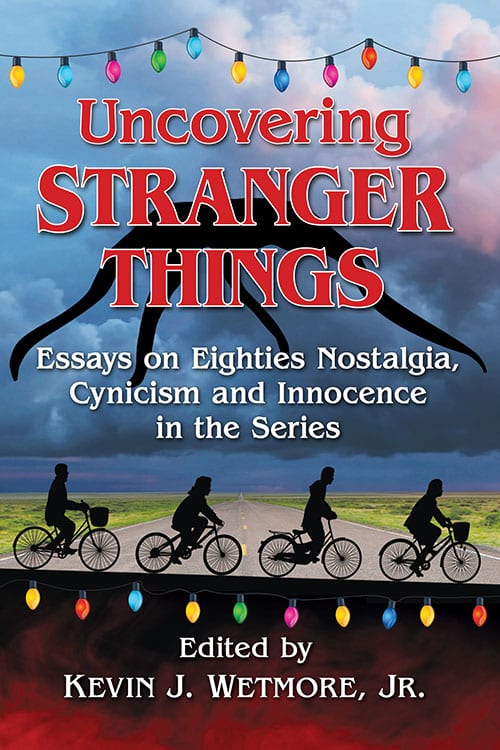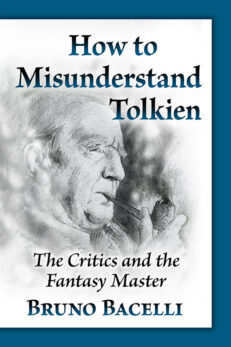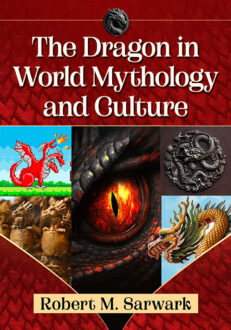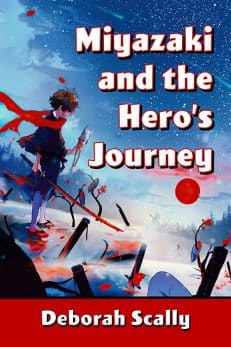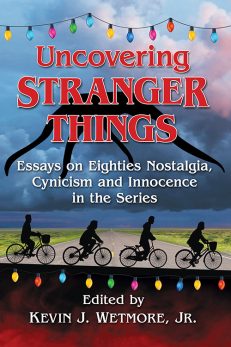Uncovering Stranger Things
Essays on Eighties Nostalgia, Cynicism and Innocence in the Series
$19.99
In stock
About the Book
The Duffer Brothers’ award-winning Stranger Things exploded onto the pop culture scene in 2016. The Netflix original series revels in a nostalgic view of 1980s America while darkly portraying the cynical aspects of the period. This collection of 23 new essays explores how the show reduces, reuses and recycles ’80s pop culture—from the films of Spielberg, Carpenter and Hughes to punk and synthwave music to Dungeons & Dragons—and how it shapes our understanding of the decade through distorted memory. Contributors discuss gender and sexual orientation; the politics, psychology and educational policies of the day; and how the ultimate upper-class teen idol of the Reagan era became Stranger Things‘ middle-aged blue-collar heroine.
About the Author(s)
Kevin J. Wetmore, Jr., is a professional actor and director whose previous books have covered topics ranging from Star Wars to Renaissance faires. He is a professor and chair of the theater department at Loyola Marymount University in Los Angeles, California.
Bibliographic Details
Edited by Kevin J. Wetmore, Jr.
Format: softcover (6 x 9)
Pages: 262
Bibliographic Info: notes, index
Copyright Date: 2018
pISBN: 978-1-4766-7186-4
eISBN: 978-1-4766-3364-0
aISBN: 978-1-4766-4899-6
Imprint: McFarland
Table of Contents
Acknowledgments vi
Introduction: Stranger (Things) in a Strange Land or, I Love the ’80s? (Kevin J. Wetmore, Jr.) 1
Section I: Popular Culture
The Rebirth of King’s Children (Ashley Jae Carranza) 8
Lost Nights and Dangerous Days: Unraveling the Relationship Between Stranger Things and Synthwave (Nicholas Diak) 20
Transmissions from the Upside Down: Post-Punk Sound Waves in Stranger Things (Jennifer Kirby) 29
Competing Nostalgia and Popular Culture: Mad Men and Stranger Things (Ryan Twomey) 39
Stranger Things and Our Memories of Colombian TV in the Late Eighties: Bringing Back Alf, V.I.C.I., Evie and Guri-Guri (Enrique Uribe-Jongbloed and Sergio Roncallo-Dow) 49
Monsters and Moral Panics: Dungeons & Dragons as Force of Good in Stranger Things (Kevin J. Wetmore, Jr.) 60
Section II: Cinema
The Eaten-for-Breakfast Club: Teenage Nightmares in Stranger Things (Rose Butler) 72
Women as Stranger Things: Frankensteinian Exploitation and Weaponization of Female Bodies (Melissa A. Kaufler) 84
Not a Princess Anymore: How the Casting of Winona Ryder in Stranger Things Speaks to the Essential Falsehood of 1980s Media Depictions of the American Working Class (Lisa Morton) 93
Stranger (The) Thing: Echoes of John Carpenter in the Series (John Palisano) 103
Spielberg Things: The Nostalgic Heart of Stranger Things (Jacopo della Quercia) 112
Section III: Gender and Orientation
Revisiting the Monstrous Feminine and Monster Parents in Stranger Things (Elsa M. Carruthers) 128
AIDS, Homophobia and the Monstrous Upside Down: The Queer Subtext of Stranger Things (Emily E. Roach) 135
The Monstrous Queer Child: Mobbing, Bullying and Bad Parenting in the 1980s (Fernando Gabriel Pagnoni Berns, Canela Ailén Rodriguez Fontao and Mariana S. Zárate) 146
Gaslighting, Marginalization and the Well-Coiffed in Stranger Things (Rhonda Jackson Joseph) 156
Badass Mothers: Challenging Nostalgia (Brenda Boudreau) 164
Section IV: Society, Culture and Politics of the Eighties
Half-Lives of the Nuclear Family: Representations of the Mid-Century American Family in Stranger Things (Anthony David Franklin) 174
The Forgotten Rural: Bungling Police Officers and the Rise of Vigilantism in 1980’s Film, Culture and Stranger Things (Dustin Freeley) 183
“Should I Stay or Should I Go?”: Stranger Things and the In-Between (Christine Muller) 195
The Upside Down of Education Reform During the Reagan Era: A Re-Examination of Education Policies Through Stranger Things (Ludovic A. Sourdot) 205
“A nice home at the end of the cul-de-sac”: Hawkins as Infected Postmodern Suburbia (Lacey N. Smith) 215
The Nine Most Terrifying Words in the English Language (Scott Wartham) 225
The Strangest Thing About Stranger Things (Jimmy Butts) 235
About the Contributors 247
Index 251
Book Reviews & Awards
- Finalist, Bram Stoker Award—Horror Writers Association
- “An interesting read…this unassuming series spearheaded the revival of modern nostalgia…a great study of how the world gets remembered through rose-colored glasses.”—Against the Grain
Author Interview
Review Fix chats with editor Kevin J. Wetmore, Jr., of Uncovering Stranger Things: Essays on Eighties Nostalgia, Cynicism and Innocence in the Series, who discusses why the book was written and how he’d like it to be remembered.
Review Fix: What inspired the creation of this book?
Kevin J. Wetmore, Jr.: This book actually began as a conversation on Facebook between various authors who had written for McFarland in the past. We were discussing the series with a focus on both its use of nostalgia and its concurrent cynicism towards the eighties as well and an editor at McFarland (Dylan Lightfoot) said it would make a great book if someone were willing to edit all these ideas together. I had edited over a dozen books before, including several for McFarland, and so I volunteered. Only two folks from that original conversation ended up contributing, but I put out a call for additional contributors and received about eighty submissions from folks who wanted to write about Stranger Things. I was fortunate enough to get some really great essays and have some really impressive and insightful individuals wanting to write for this book. In a way, I feel like this was a gift, as I could ask people to write the book I wanted to read. I wrote a chapter myself (on Dungeons & Dragons in the series) and an introduction and then organized the remaining submissions by theme and approach into the volume that McFarland then published.
Review Fix: What makes Stranger Things worthy of a book like this in your opinion?
Wetmore: It is simply an inspired series. For guys who grew up after the eighties, the Duffer Brothers sure got the decade right, at least as I remember it. The series captures the flavor of the weird pop culture of the period – one of the things I love about the book is that we have three essays, one arguing the series is derived from the films of Spielberg, one arguing it is derived from the films of John Carpenter and one arguing it is derived from the films of John Hughes (deliciously titled “The Eaten-for-Breakfast Club”!) and all three are right. Not only did the series generate tremendous interest even outside of genre fans, its narrative of the lost boy and the larger conspiracies behind his disappearance really struck a nerve in America and beyond. There is an excellent essay in the book on how the series evoked watching American television in the eighties in Colombia. So ST was an international phenomena that really spoke to the generation that came of age in the eighties, but also grabbed the attention of those who grew up afterward. It’s also just well-written, well-acted and crafted to keep you both in suspense and rooting for its collective young protagonists. Watching it reminded me what it was to be twelve again.
Review Fix: What was the editing process like?
Wetmore: It was a little crazy, simply because of how McFarland and I wanted to do the book. Rather than rush it out in time for season two, we did a two-step process. Each writer had to finish her or his chapter by the time season two premiered. They then had four weeks to watch all of season two and incorporate it into their essays. I was impressed and relieved how seamless the second drafts were. I was worried some of the essays would feel like the second season stuff was just tacked on, but the contributors really rose to the challenge. The second season also expanded the universe of Stranger Things while keeping it rooted in the same world. It perhaps was easy in some ways to simply use further examples from this new story arc, yet some of the contributors also substantially rewrote their pieces to get the final version to say something significant about the series as a whole. The book then came out in April and it was kind of crazy to think that only a year had passed between initial conversation and the book in our hands.
Review Fix: In your opinion, how do you feel people will feel about Stranger Things in a decade or so?
Wetmore: I think so long as it is still streaming there will still be folks watching it. I look at shows like Twin Peaks and The X-Files that even reboot because the fanbase is still so strong and devoted after two decades. So it would not surprise me in the least to see something like “Return to Hawkins” in 2036 on whatever Netflix is then (streaming directly into your brain via implant?) in which the characters as adults return to the small town in 2003. Since one of the key influences on the series is Stephen King, the show can certainly create a very It-vibe in which the boys and Eleven (and maybe Max) return to deal with a new outbreak of the Upside Down. But even if that never happens, I think you’ll see a small but devoted fanbase rewatching the series again and again, perhaps even with their kids.
Review Fix: What did you learn through the writing process that you weren’t expecting?
Wetmore: Every time I edit a book like this it’s like a crash course in the subject matter in which I learn how much I don’t know about a subject. The best part of my job is being the first to read an essay and have it shift and shape the way I view the series. So when I read Nicholas Diak’s essay on synthwave I find a whole world of music I knew little about but after reading it, find it has shaped the way I listen to Stranger Things. Lisa Morton contrasts Winona Ryder’s character in ST to her 80s roles as suburban odd girl to critique how the working class is depicted in cinema. I would never have thought of that in a million years. Now I can’t unsee it. Rhonda Jackson Joseph looks at gaslighting and the hairstyles of the characters who do it and who are the victims of it. Again, never would have occurred to me, but her insightful analysis really shows both the attention paid to detail by the Duffers and this really interesting aspect of eighties cinema (bad guys are always well-groomed and well-coiffed) that echoes in ST. Ludovic Sourdot on the representation of Reagan-era education policy in the series, Scott Wartham on Reagan-inspired government mistrust (“The nine most terrifying words in the English language are: ‘I’m from the government and I’m here to help’”), and Emily Roach on AIDS and its metaphoric representation in ST are but three more examples of folks who looked at the series and saw things that were there but that not everyone would pick up on. That’s the joy of a book like this one – it allows the fan to appreciate the series on multiple levels while also seeing it in its contexts.
Review Fix: What are your goals for the book?
Wetmore: I hope people who like the series read it. I hope they learn from it and watch the show (or even rewatch the show) with new eyes. We have one or two more seasons left according to Netflix and the Duffer Brothers. So I hope folks might come to the book and then watch the new seasons with informed eyes and attitudes.
I suppose my other goal for the book has already been met – just to put together the best possible collection of essays about this narrative that I love so much and that has come to mean a good deal to geeks of my generation (of which I am a huge one). So check that off the list.
Review Fix: How would you like it to be remembered?
Wetmore: An insightful collection of essays worthy of the bookshelf of both the casual fan and the university library. As a scholar, I view my job as furthering the conversation about what our culture means to us and contextualizing our culture with our history, politics and society. So I write books about things like how 9/11 transformed horror cinema, or how zombie films have changed over time, or how Battlestar Galactica is also a profoundly religious text that makes statements about American culture. So I hope this volume is remembered as another analytical tool to help us understand who we are based on the stories we tell ourselves.
Review Fix: What’s next?
Wetmore: Right now I’m editing another anthology for McFarland, this time on Netflix’s The Haunting of Hill House, and I have just begun to review the essays for that book. I’m writing the Devil’s Advocate’s series volume for The Conjuring, I have a number of short stories coming out soon, and more that need to be finished and sent out, as well as a number of essays and book chapters for other folks’ books. I’m working on essays on Lovecraft on stage, the representation of Japanese culture in Westworld, scarecrow cinema, and trucker cinema.
Review Fix: Anything else you’d like to add?
Wetmore: Thanks for the interview, thanks for reading it, and if you’re at all interested, read the book. Feel free to drop a line and let me know what you think. And as always, whether you like the book or not, and this is not just for me but for all authors, if you read a book and get something out of it, leave a review of it somewhere – Amazon, Goodreads, BN.com, wherever – authors live and die by reviews, so help us out.

